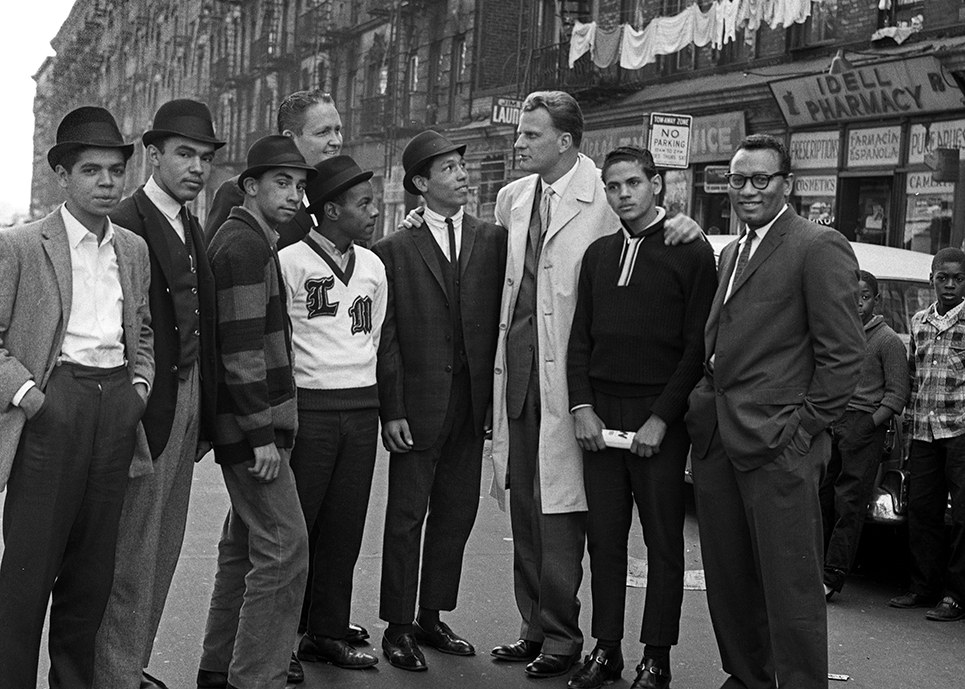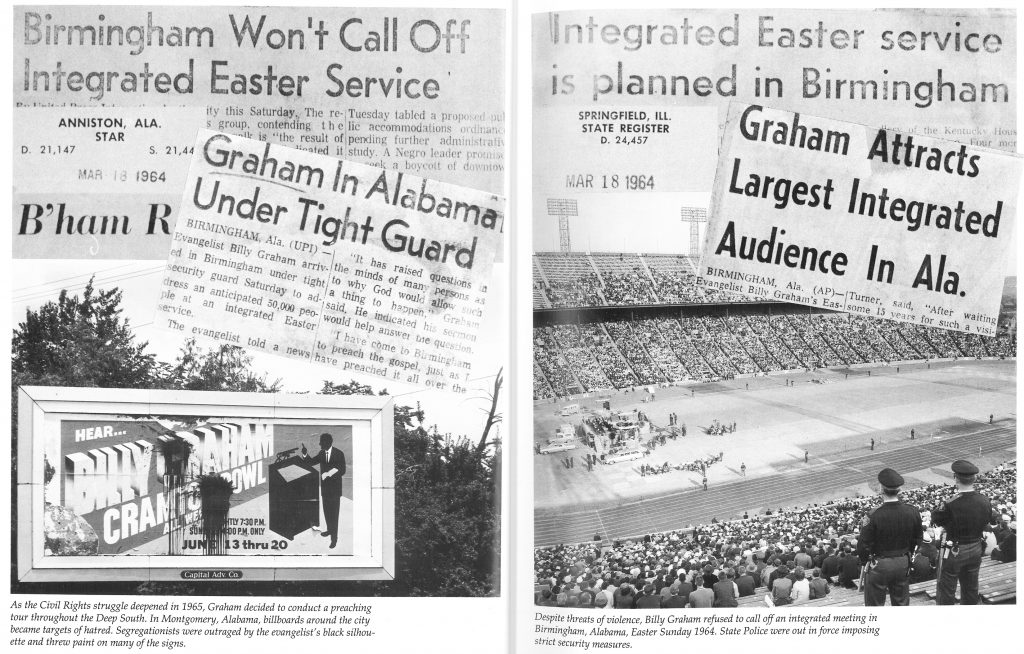Billy Graham on Racism
January 8, 2018
Categories: Billy Graham, In His Own Words

From the time he became a Christian, Billy Graham said, “I could not understand segregation in the church.” By 1952, he felt compelled to take what was considered at the time a dramatic stand. He was scheduled to hold a Crusade in Jackson, Mississippi, and the seating had been arranged to accommodate a segregated audience. Ropes were erected to keep blacks and whites apart. When Graham arrived at the meeting, he personally went over and pulled the ropes down and refused to let them be put back up.
“That was among my first act of conscience on the race question. I determined from then on I would never preach to another segregated audience.” His longtime associate, Cliff Barrows, who has been with Billy Graham for over 40 years, recalls the incident:
He actually physically took ropes down and symbolically, in doing so, said, “Look, we’re all equal before God, we’re all one together and every man has his right for the rights that we enjoy and want.” He took a lead in the stand way back in those early days when it wasn’t popular. Bill has always had a love for people and has appreciated and understood in a very unique dimension the worth of an individual no matter what his or her race, color, ethnic background many be.
Some said Billy Graham made a lot of enemies in pulling down those ropes, but for him it was a matter of Christian conviction and conscience.
from Billy Graham: Footprints of Conscience

In 1993, Billy Graham wrote this message on the sin of racism:
Racial and ethnic hostility is the foremost social problem facing our world today. From the systematic horror of “ethnic cleansing” in Bosnia to the random violence ravaging our inner cities, our world seems caught up in a tidal wave of racial and ethnic tension. This hostility threatens the very foundations of modern society.
We must not underestimate the devastating effects of racism on our world. Daily headlines chronicle its grim toll: divided nations and families, devastating wars and human suffering on an unimaginable scale, a constant downward spiral of poverty and hopelessness, children cruelly broken in body and warped in heart and mind. The list is long, but for the sensitive Christian, it is even longer: whole peoples poisoned by violence and racial hatred and closed to the gospel as a result; indifference and resistance by Christians who are intolerant toward those of other backgrounds, ignoring their spiritual and physical needs.
Racism—in the world and in the church—is one of the greatest barriers to world evangelization.
Racial and ethnic hatred is a sin, and we need to label it as such. Jesus told his disciples to “love your neighbor as yourself” (Matt. 22:39); and in reply to the question “Who is my neighbor?” he responded with a pointed parable about a good Samaritan, a member of a despised race (Luke 10:25-37).
Racism is a sin precisely because it keeps us from obeying God’s command to love our neighbor, and because it has its roots in pride and arrogance. Christians who harbor racism in their attitudes or actions are not following their Lord at this point, for Christ came to bring reconciliation—reconciliation between us and God, and reconciliation between each other. He came to accept us as we are, whoever we are, “from every tribe and language and people and nation” (Rev. 5:9).
Tragically, too often in the past evangelical Christians have turned a blind eye to racism or have been willing to stand aside while others take the lead in racial reconciliation, saying it was not our responsibility. (I admit I share in that blame.) As a result, many efforts toward reconciliation in America have lacked a Christian foundation and may not outlive the immediate circumstances that brought them into existence. Our consciences should be stirred to repentance by how far we have fallen short of what God asks us to be as his agents of reconciliation.
Racism is not only a social problem, therefore; because racism is a sin, it is also a moral and spiritual issue. Legal and social efforts to obliterate racism (or at least curb its more onerous effects) have a legitimate place. However, only the supernatural love of God can change our hearts in a lasting way and replace hatred and indifference with love and active compassion.
No other force exists besides the church that can bring people together week after week and deal with their deepest hurts and suspicions. Of all people, Christians should be the most active in reaching out to those of other races, instead of accepting the status quo of division and animosity.
The issues that face us are complex and enormous, and simply wishing they would go away will not solve them. I do not pretend to know the full answer. But let those of us who claim the name of Christ report of our past failures and relying on the Holy Spirit, demonstrate to a weary and frightened world that Christ indeed “has destroyed the barrier, the dividing wall of hostility … through the cross, by which he put to death their hostility” (Eph. 2:14-15).
from Christianity Today, Oct. 4, 1993